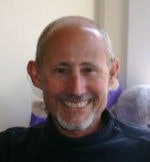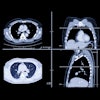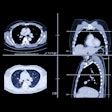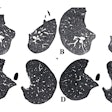
This February marks the 20th anniversary of the founding of AuntMinnie.com by radiologist and imaging entrepreneur Dr. Phillip Berman. February 8 is also the 10th anniversary of Phil's death at age 55 of non-small cell lung cancer.
Phil told a colleague in 2004 after being diagnosed with late-stage lung cancer that he was not scared but "pissed off and sad." Even after his diagnosis, Phil was determined to live life to the fullest for the sake of his family, as well as for other lung cancer patients, founding a web portal for cancer survivors that offered practical advice and a much-needed sense of community.
 Dr. Phillip Berman.
Dr. Phillip Berman.Phil had a wonderful sense of humor, as evidenced by his selection of the name AuntMinnie.com for the web portal he was developing in 1999. The name came from the term "Aunt Minnie," coined by Phil's mentor, Dr. Benjamin Felson of the University of Cincinnati, to describe a case where the diagnosis was obvious, one that you would recognize like the face of your favorite Aunt Minnie.
I met Phil in 2005, a year after relocating the Lung Cancer Alliance (LCA) to Washington, DC. Like Phil, I was first diagnosed with lung cancer at the age of 50. We discussed everything from shortness of breath to staffing and fundraising to entrenched bureaucracies and naysayers. His advice was always excellent, upbeat, irreverent, and amusing.
We cheered in 2006 when the New England Journal of Medicine published the findings of International Early Lung Cancer Action Program (I-ELCAP) researchers on the power of CT screening to diagnose lung cancer at a curable, early stage. He would have cheered even more when private insurers recognized the cost-effectiveness of CT screening and voluntarily began to cover the exam, and when the U.S. Centers for Medicare and Medicaid Services (CMS) eventually followed suit after the U.S. Preventive Services Task Force gave lung cancer screening its approval in 2013.
But what would Phil say now about the fact that, to date, less than 2% of those eligible for screening -- high-risk current and former smokers -- have actually been screened?
I can hear him ask in his probing, direct way:
- What are primary care doctors doing about low CT lung screening rates? Where are the U.S. National Cancer Institute, the U.S. Centers for Disease Control and Prevention, and other responsible public health agencies?
- Why is the U.S. Department of Veterans Affairs still stalling on system-wide screening when military veterans are at such high risk for lung cancer?
- Why did CMS mandate that patients undergo a separate shared decision-making meeting for lung cancer screening? It's costly and an added burden for patient and doctor alike -- and it's not mandated for breast or colon cancer screening.
- Why is the shared-decision meeting reimbursed at higher rates than the actual screening exam?
- Why are the shared-decision aids so negative? Doctors routinely discuss the risks and benefits of screening options with their patients. So why is the mandate for a separate shared-decision meeting on CT lung cancer screening necessary at all?
- Is the stigma against smokers and former smokers still at play?
- Why do so many health professionals see CT lung cancer screening as a threat rather than a resource?
- What is being done about expanding the criteria for screening to other high-risk groups: those with a family history of lung cancer or exposure to industrial carcinogens, or to younger people and nonsmokers like me?
What would Dr. Phillip Berman think of the current state of CT lung cancer screening? Bottom line: He would be "pissed off and sad."
Sheila Ross, a two-time survivor of lung cancer, has been an advocate for lung cancer research and screening since 2002, initially as the Washington representative of ALCASE, the original lung cancer patient support organization, then located on the West Coast. Recognizing that health policy also had to be addressed, she relocated the organization to Washington, DC, as the Lung Cancer Alliance in 2004. The LCA is nationally recognized for its leadership on lung cancer advocacy and public health policy.
The comments and observations expressed are those of the author and do not necessarily reflect the opinions of AuntMinnie.com.




















